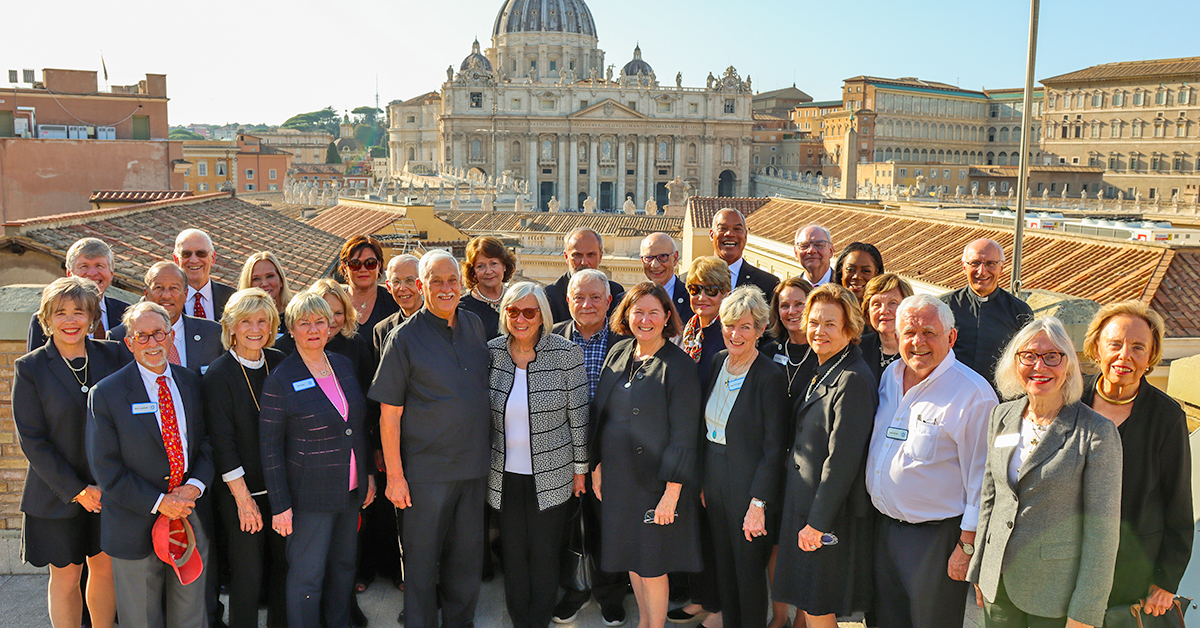
25 Oct October 2022 Reflection – Michael McFarland SJ
Insights from Rome
We have just completed our week-long Colloquium in Rome, bringing trustees and supporters to visit the Gregorian University and Biblical and Oriental Institutes, along with the Vatican, the Jesuit Curia and other key Jesuit sites. It was not just an informative and engaging experience, but also a deeply spiritual one, as the group reflected, shared and prayed together, forming strong bonds of friendship, trust and support. They got to meet His Holiness Pope Francis, the Jesuit General Fr. Arturo Sosa, Cardinal Parolin, the Vatican Secretary of State, Cardinal Ladaria, the Prefect of the Dicastery for the Doctrine of the Faith, Cardinal Roche, the Prefect of the Dicastery on Liturgy and the Sacraments and other key Jesuit and Vatican officials.
Just as impressive and memorable were the extraordinarily talented and devoted students we met, from every part of the world, all dedicated to serving the Church and their communities. It was inspiring to see students from every different background, diocesan seminarians and priests, men and women from a wide variety of religious orders, and lay people, from every race and culture, working together in harmony, caring for and supporting one another in a common quest for a deeper understanding of our faith and its manifestation in our world. Many, especially lay people and religious women, are there at great personal sacrifice, living in cramped quarters, commuting three or more hours a day to and from school and skimping on food. It brought home the need for even more scholarship help than we provide now.
The faculty too stood out for the way they combine depth of learning and intellectual rigor with exceptional care for the students and their intellectual, moral and spiritual formation. The tremendous respect and admiration the students and graduates have for their professors came across very clearly. In addition to providing a solid grounding in philosophy, theology and the social sciences, the schools make sure the students are prepared to deal with the most pressing issues facing the Church and the world. We visited the new offices of the IADC (formerly the Center for Child Protection), where the president, Fr. Hans Zollner, SJ, explained how he is planning to expand his training in safeguarding to other parts of the world for those who cannot come to Rome and also doing in-depth research on the causes of abuse in order to find ways to prevent it in the future. We learned of new programs on interreligious dialogue and understanding, including Ecumenical Relations, Judaic Studies and Christian-Jewish relations. There are also new programs in leadership and management that draw on the best practices in the secular world, along with Catholic social teaching and spirituality, in order to equip current and future Church authorities to be more competent, collaborative and inclusive.
The Gregorian has taken the lead in creating a joint program in Integral Ecology, offered at several of the Pontifical Universities, in response to Pope Francis’s Laudato Si’. The Department of Moral Theology explores many pressing ethical issues, including war and mass violence, economic justice, racism and other forms of discrimination, migration, the environment, and ethics of the family. Many advanced doctoral and licentiate students are also exploring contemporary issues in their theses. For example, a doctoral student at the Biblical Institute is researching the bitter relationships between the Jews and their Samaritan neighbors, who shared their original heritage, in order to get insight into the troubling question, “Why do we hate those who are most like us?” At the Oriental Institute, several students from countries devastated by war, such as Syria, Iraq and now Ukraine, are researching their founding traditions and texts in order to establish a basis for rebuilding their shattered societies in a way that authentically reflects their true cultural and religious identity.
The unity of purpose, commitment to service and prayerful environment of these institutions give them a distinctive character, even among other Jesuit schools. This explains why they have been so successful in attracting top candidates from around the world and preparing them effectively for leadership at every level of the Church. That is why, as Fr. General Sosa affirmed in his remarks to us, the Gregorian University and the Biblical and Oriental Institutes are among the highest priorities of the Society of Jesus, with special concern for the process of integrating them into a more unified and efficient structure, guaranteeing their long-term sustainability and ensuring that they continue to offer an education of the highest quality. All of us who attended the Colloquium were able to see the surpassing value of this work and are committed to working together to support it.
Michael C McFarland, SJ
President, Gregorian University Foundation



